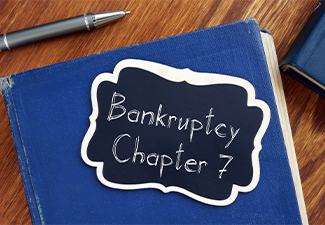Five Common Myths About Filing Chapter 7
Oct. 7, 2025
 Being in debt can feel overwhelming, but there are legal options available to help you achieve a fresh start. One option to relieve debt is filing for bankruptcy, a process that can help discharge or restructure your debts. However, misinformation about bankruptcy can often prevent people from seeking help. Attempting to file without proper legal support can lead to costly mistakes, so working with an attorney is the best way to protect your rights and assets.
Being in debt can feel overwhelming, but there are legal options available to help you achieve a fresh start. One option to relieve debt is filing for bankruptcy, a process that can help discharge or restructure your debts. However, misinformation about bankruptcy can often prevent people from seeking help. Attempting to file without proper legal support can lead to costly mistakes, so working with an attorney is the best way to protect your rights and assets.
At Vivona Pandurangi, PLC, we strive to provide clear and straightforward legal guidance to those considering Chapter 7 bankruptcy. Our experienced bankruptcy attorneys take a results-oriented approach to every case, focusing on practical solutions that help you move forward. With offices in Falls Church and Alexandria, Virginia, we serve clients in Arlington, Fairfax, Manassas, Prince William, and Loudoun.
Here, we will examine some of the common myths surrounding one of the most common types of bankruptcy, Chapter 7 bankruptcy, and how you can overcome them.
Myth 1: You Will Lose Everything You Own
A persistent fear surrounding Chapter 7 bankruptcy is the idea that you will be forced to sell all your possessions, leaving you with nothing. This is not true for most filers. The legal system provides for "exemptions," which protect certain types of property up to a specific value.
When you file for Chapter 7, the court will appoint a trustee to your case. Their job is to see if you have any "non-exempt" assets that can be sold to repay your creditors. However, most essential property falls under exemption categories. This includes items such as your primary vehicle, household goods and furnishings, clothing, and tools that are necessary for your job. Retirement accounts, such as 401(k)s and IRAs, are also typically protected.
Since these exemptions are in place, most people who file for Chapter 7 bankruptcy do not lose any of their property. An attorney can help you review your assets and explain exactly which items are protected under state and federal law.
Myth 2: Filing for Bankruptcy Means You Are Financially Irresponsible
Another common misconception is that filing for bankruptcy is a sign of personal failure or reckless spending. In reality, the vast majority of bankruptcies are triggered by circumstances far outside your control. Medical emergencies are a leading cause, as unexpected illnesses or accidents can result in staggering bills, even for those with health insurance.
Job loss, a reduction in income, or divorce are other common reasons people find themselves unable to meet their financial obligations. These life events can happen to anyone, regardless of how carefully you have managed their finances.
Filing for bankruptcy is not an admission of failure. It is a legal tool that provides honest but unfortunate debtors a chance to reset their financial lives. It provides a structured way to resolve unmanageable debt and begin building a more stable future. Choosing to face your financial situation head-on is a responsible and proactive step.
Myth 3: Your Credit Will Be Ruined Forever
Many people worry that filing for bankruptcy will permanently damage their credit and prevent them from obtaining a loan again. While it is true that filing for Chapter 7 will impact your credit score in the short term, its effects are not permanent. Chapter 7 bankruptcy will remain on your credit report for up to 10 years, but its influence on your score will diminish over time.
In fact, many people find that their credit score begins to improve relatively quickly after their debts are discharged. This is because the bankruptcy eliminates high-balance debts and delinquencies, which were likely already damaging your credit. With your debt-to-income ratio dramatically improved, you become a more attractive candidate for new credit.
You will likely start receiving offers for credit cards and car loans soon after your case is complete. By using this new credit responsibly—making small purchases and paying the balance in full each month—you can actively rebuild your credit score much faster than you might think.
Myth 4: Everyone Will Know You Filed for Bankruptcy
The thought of friends, neighbors, or coworkers finding out about a bankruptcy filing can be a significant source of anxiety. While bankruptcy filings are public records, the reality is that it is unlikely anyone will find out unless you disclose it.
Your case information will be filed with the federal court system, not advertised in your local newspaper or broadcast publicly. For someone to discover your filing, they would have to search the court records for your name specifically. Unless you are a prominent public figure or a major corporation, it is improbable that anyone would have a reason to do this.
Your employer will not be notified of your filing unless they are also one of your creditors. The process is designed to be discreet, allowing you to resolve your financial issues without unnecessary public attention. An experienced attorney can help you handle all communications with creditors and the court, thereby protecting your privacy throughout the process.
Myth 5: You Can't File for Bankruptcy If You Have a Job
There is a common belief that you must be unemployed to qualify for Chapter 7 bankruptcy. This is incorrect. Having a job and a steady income does not automatically disqualify you from filing. Your eligibility is determined by a process called the "means test." The means test compares your household income to the median income for a household of your size in Virginia. If your income is below the state median, you will generally qualify for Chapter 7.
If your income is above the median, you may still be able to file. However, the second part of the means test will allow you to deduct certain necessary expenses from your income, such as mortgage payments, taxes, and childcare costs. If your disposable income is below a certain threshold after these deductions, you can still be eligible for Chapter 7. An attorney can often perform this calculation for you to determine if you qualify.
Virginia Bankruptcy Exemptions
In Virginia, you can choose between federal exemptions and state exemptions when you file for bankruptcy. At Vivona Pandurangi, PLC, we help clients select the set of exemptions that best protects their specific assets. Virginia's state exemptions include a "homestead exemption" that allows you to protect a certain amount of equity in any property you own, including your home, car, or cash. Recent updates have increased this amount, providing more protection for your property during the bankruptcy process.
Bankruptcy Attorneys in Falls Church and Alexandria
At Vivona Pandurangi, PLC, we believe legal assistance should be accessible and affordable. Our attorneys are committed to helping you determine whether Chapter 7 bankruptcy is right for you and, whenever possible, sidestep legal red tape and associated costs. We are determined advocates for our clients and strive to bring a results-oriented mindset to your case.
With offices in Falls Church and Alexandria, Virginia, we serve the areas of Arlington, Fairfax, Manassas, Prince William, and Loudoun. Contact us to schedule a consultation to discuss your options. Reach out today.
